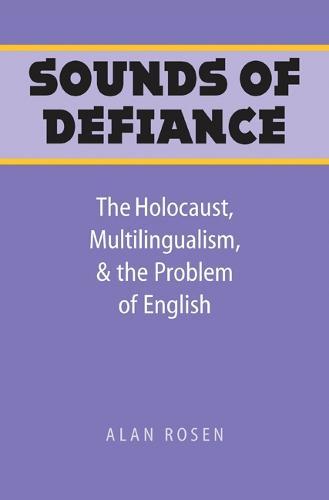Overview
Language has frequently been at the center of discussions about Holocaust writing. Yet English, a primary language of neither the persecutors nor the victims, has generally been viewed as marginal to the events of the Holocaust. Alan Rosen argues that this marginal status profoundly affects writing on the Holocaust in English and fundamentally shapes our understanding of the events. Sounds of Defiance chronicles the evolving status of English in writing about the Holocaust, from the period of the Second World War to the 1990s. Each chapter highlights a representative work from a different genre—psychology, sociology, memoir, tales, fiction, and film—and examines the special position of English with regard to the Holocaust, supported by references to the role of other languages, including Hebrew, Yiddish, and German. This original approach provides a new perspective on such standard works as Eichmann in Jerusalem, The Shawl, and Maus, while drawing attention to others largely unknown. Rosen also links this analysis of English writing to developments in the postwar period: the escalating production of writing on the Holocaust in English; the increasing prestige of English as a global language; and paradoxically, within the contexts of neocolonial and multilingual studies, the increasingly uncertain position of English.
Full Product Details
Author: Alan Rosen
Publisher: University of Nebraska Press
Imprint: University of Nebraska Press
Dimensions:
Width: 15.20cm
, Height: 1.50cm
, Length: 22.90cm
Weight: 0.397kg
ISBN: 9780803220683
ISBN 10: 0803220685
Pages: 250
Publication Date: 01 December 2008
Audience:
Professional and scholarly
,
Professional & Vocational
Format: Paperback
Publisher's Status: Active
Availability: In Print

This item will be ordered in for you from one of our suppliers. Upon receipt, we will promptly dispatch it out to you. For in store availability, please contact us.
Reviews
How English, so far removed from the European killing fields, became the main venue worldwide for mediating the Holocaust, is the subject of this excellent work. Beginning in the immediate aftermath of the war, with novelist John Hersey and ethnographer David Boder, Rosen takes us to our own day, when English itself is being reconfigured in order to reflect the complex linguistic landscape of survivors, children of survivors, and bystanders. Sounds of Defiance provides us with a linguistic map of the Holocaust for the twenty-first century. David G. Roskies, author of Against the Apocalypse Alan Rosen's focus on North American authors makes an important contribution to the critical discourse on American Holocaust literature as well as to Holocaust literary criticism as a whole. While others have discussed English Holocaust texts at length, language per se has been of peripheral concern with Holocaust themes, experience, and representation the privileged foci. Rosen brings the discussion of language from the margins to the center S. Lillian Kremer, the editor of Holocaust Literature: An Encyclopedia of Writers and Their Work Not only does Alan Rosen convince the reader of the relevance of English as a central language in these texts on the Holocaust, but because of his unique and original viewpoint, he is able to develop compelling, profound, and original analyses of the texts he treats. Nancy Harrowitz, editor of Tainted Greatness: Antisemitism and Cultural Heroes
How English, so far removed from the European killing fields, became the main venue worldwide for mediating the Holocaust, is the subject of this excellent work. Beginning in the immediate aftermath of the war, with novelist John Hersey and ethnographer David Boder, Rosen takes us to our own day, when English itself is being reconfigured in order to reflect the complex linguistic landscape of survivors, children of survivors, and bystanders. Sounds of Defiance provides us with a linguistic map of the Holocaust for the twenty-first century. David G. Roskies, author of Against the Apocalypse Alan Rosen's focus on North American authors makes an important contribution to the critical discourse on American Holocaust literature as well as to Holocaust literary criticism as a whole. While others have discussed English Holocaust texts at length, language per se has been of peripheral concern with Holocaust themes, experience, and representation the privileged foci. Rosen brings the discussion of language from the margins to the center S. Lillian Kremer, the editor of Holocaust Literature: An Encyclopedia of Writers and Their Work Not only does Alan Rosen convince the reader of the relevance of English as a central language in these texts on the Holocaust, but because of his unique and original viewpoint, he is able to develop compelling, profound, and original analyses of the texts he treats. Nancy Harrowitz, editor of Tainted Greatness: Antisemitism and Cultural Heroes
Author Information
Alan Rosen is a 2004–2005 fellow at the Center for Advanced Judaic Studies at the University of Pennsylvania and the 2005 Sosland Fellow at the Center for Advanced Holocaust Studies at the United States Holocaust Memorial Museum. He has published books and articles on Holocaust writing and is currently working on a book dealing with David Boder and Holocaust testimony.




